Characteristics of a Trauma Informed Workplace
Visit our sponsor: https://privatelabelworkbooks.com
📢SUBSCRIBE and click the BELL to get notified when new videos are uploaded.
💲 Unlimited CEUs $59 based on these videos at allceus.com for social work, counseling, marriage and family therapy, addiction counseling, case management, pastoral counseling and more.
Join this channel to get access to perks:
https://www.youtube.com/channel/UCAE3JJi8tX7gfhZEXCUGd_A/join
#traumainformed #organizationalleadership #burnout
NOTE: ALL VIDEOS are for educational purposes only and are NOT a replacement for medical advice or counseling from a licensed professional.
Objectives
What is a Trauma Informed Workplace?
How Does Trauma Impact Staff, Clients and the Organization Itself
Trauma and the Organization
An estimated 70 percent of adults in the United States have experienced a trauma (employees, caregivers, providers…)
This means that traumatized individuals who are likely reenacting their own trauma dynamics are the ones running the environments in which people are supposed to recover from trauma.
Organizations are living, adaptive systems which are vulnerable to stress, particularly chronic stress.
Organizations can be traumatized and the result of traumatic experience can be devastating
What is a Trauma Informed Workplace
An organization that recognizes
Trauma is any event that overwhelms our ability to cope.
Most people have experienced trauma, although most do not have PTSD
Prior traumatic experiences influence how people perceive and react to events in the present
Clients, staff and the organization all can experience trauma, have trauma triggered within them and trigger trauma in the other two
Inventory
What types of trauma have you experienced? Your staff? Your clients?
Think of problem behaviors from staff or clients. In what ways might each of those be a response to triggered trauma?
How many of those people recognize their reaction as a trauma response?
How might it impact your organization if clients and staff are being triggered?
Organizational Trauma
Organizations are living entities that are “born,” develop and grow and can be hurt or “killed”
The C-suite executives are like the brain.
Staff is like the nervous system that sends messages to the C-suite and responds to the environment created by other staff, the executives, and clients
Like individuals, when an organization experiences a trauma, that event alters the way all parts of the organization perceive and react to future situations
Organizational Trauma
The organization as a whole experiences harm or a threat of harm as a result of direct actions or triggered memories of prior trauma (budget cuts, failed audits, supply chain disruption, lawsuits).
The organization as a whole experiences a sense of unsafeness (could be shut down) and disempowerment (even though we are doing the right things (or think we are))
Staff Trauma
The staff members experience harm or a threat of harm due to direct actions of clients, the organization, other staff or due to triggered memories
The staff members experience a sense of unsafeness (could be hurt, fired/laid off, disciplined) and disempowerment (even though they are trying)
Client Trauma
The clients experience harm or a threat of harm due to direct actions of staff, the organization, other clients or due to triggered memories
The clients experience a sense of unsafeness (lack of trust/could be hurt) and disempowerment
Org Policies Trigger Client
BARES Necessities in a TI-Workplace
BARES
Build resilience in staff, clients, organization
Awareness of the impact of trauma on development, perception, coping strategies and behaviors in staff, clients, organization
Recognize and mitigate trauma triggers in the environment for staff and clients
Empower staff, clients through voice/choice and CRAVES
Safety & respect of staff and clients through nonviolent communication and cultural competence
Video by Dr. Dawn Elise Snipes on integrative behavioral health approaches including counseling techniques and skills for improving mental health and reducing mental illness.
AllCEUs provides multimedia counselor education and CEUs for LPCs, LMHCs, LMFTs and LCSWs as well as addiction counselor precertification training and continuing education.
AllCEUs courses for counselor continuing education are accepted in most states because we are an approved education provider for NAADAC, the States of Florida and Texas Boards of Social Work and Mental Health/Professional Counseling
Dr Dawn Elise Snipes provides training through AllCEUs.com that are helpful for ACA OPD, Counsellor OPD, OPD Points, LPC CEUs LMHC CEUs LCPC CEUs LSW CEUs LCSW CEUs LMFT CEUs CRC CEUs LADC CEUs CADC CEUs MAC CEUs MCAP CEUs NCC CEUS LCDC CEUs CPRS CEUs CTRS CEUs and HPCSA ACA NBCC
-
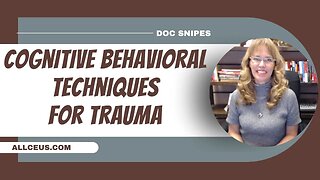 44:30
44:30
DocSnipes
2 years agoCBT Counseling for Addressing Trauma
13 -
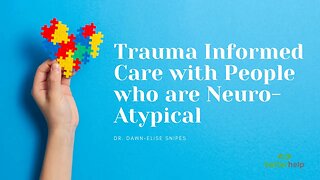 1:04:37
1:04:37
DocSnipes
3 years agoTrauma Informed Care for Persons Who Are NeuroAtypical
49 -
 9:55
9:55
LynnCCoxRTT
2 months agoOvercome Triggers from Trauma
6 -
 3:21
3:21
WorkforceAlchemy
9 months agoWhat causes employee conflict in the workplace and how can you avoid violence?
9 -
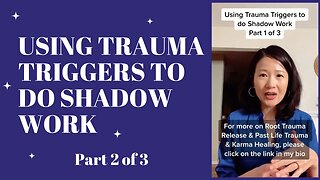 0:46
0:46
Audrey Wong
2 years agoUsing Trauma Triggers to do Shadow Work Part 2 of 3
86 -
 2:59
2:59
Kellkell4 Premium Videos
1 year agoHow Do You Survive in a Toxic Work Environment?
12817 -
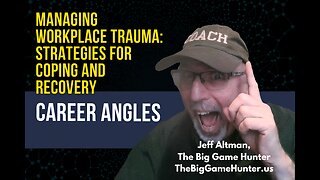 5:07
5:07
No BS Career Advice
1 year agoManaging Workplace Trauma: Strategies for Coping and Recovery
-
 25:43
25:43
Grada Robertson
9 months agoUnresolved Trauma Creates Drama!
26 -
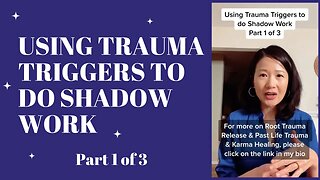 0:58
0:58
Audrey Wong
2 years agoUsing Trauma Triggers to do Shadow Work Part 1 of 3
25 -
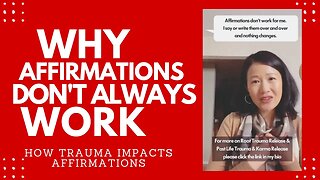 0:58
0:58
Audrey Wong
2 years agoWhy Affirmations Don't Always Work - How Trauma Impacts Affirmations
7